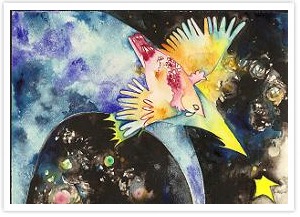Comparative Literature
| Lecturer | Miki WATANABE, Associate Professor |
|---|---|
| Department | Graduate School of Languages and Cultures, 2011 Spring |
| Recommended for: | The Graduate School of Languages and Cultures students (2・1.5 hours / session One session / week 15 weeks / semester) |

Course Aims
Literary works are created in relation to literary traditions, and one of the classic subject matters of literature has been "food culture." This time, we will consider and compare various works with regard to the theme of "self-starvation."
Key Features
-
About the production of teaching materials: Teaching materials had been prepared in advance, so that short items could be photocopied and longer items could be borrowed. There were of course literary works, commentary pieces and essays as set texts. I also used audio materials, and as with all the other materials, they were circulated in class. In the case of Miyazawa Kenji's works, I used numerous picture books as materials to point out the vast diversity of interpretations that were possible.
-
About class methods: As the classes were conducted in the form of lectures, I managed the time so that I could ask the students their opinions about that day's task at the start of the class and so that we could have another discussion after we had finished an assignment.
Learning Outcomes
- The term paper actually was about all literary works covered in class. Each student chose various works as a theme for the paper, such as Yodaka no Hoshi, Kuwazu Nyobo, Wuthering Heights, and Bungaku Shojo and the Ravenous Ghost, and they were not encouraged to concentrate on any one particular work. At the least, students were able to write an academic report in the form of a logical argument, from formulating a hypothesis, through critical interrogation, to the rendering of conclusions.
- I received a comment from one foreign student saying that although he had read Japanese newspaper articles in order to try to learn the language, he hadn't read any Japanese literary pieces in his home country. This class had inspired him to try dealing with Miyazawa Kenji's works in his language lessons. I can say there were results from the fact that he was able to learn by himself that understanding literary works leads to a fruitful understanding of Japanese language and culture.
Course Requirements
None
Contents
After first considering the true nature of the illness known as anorexia, we will examine the issue in literary works, as detailed below. I plan to cover Anglo-American literature, but I will also prepare Japanese translations for students unable to read English.
- Introduction, with instruction/advice on writing the Term Paper
- Definition and History of Anorexia
- Eating and Refusing to Eat in World Folk Tales
- The Hunger Strike: Oroonoku and Deirdre
- Aphra Behn, Orunoko, Bedford Cultural Edition.
- Deirdre, translated by Kotsuji, Umeko from Jacobs' Celtic Fairy Tales, Shakaishisou Publishing
- Refusing Food for Religious Reasons: The Tale of Genji, Clarissa, Waga shikabane ha no ni suteyo
- The Tale of Genji, The Complete Collection of Newly Edited Classical Japanese Literature 20-25
- Samuel Richardson, Clarissa, Penguin Classics
- Sae Shuichi, Waga shikabane ha no ni suteyo, Shincho Publishing
- Refusing Food from a Broken Heart: Sense and Sensibility
- Jane Austin,Sense and Sensibility, Penguin Classics
- Refusing Food as Rebellion against Patriarchal Authority: Jane Eyre and Shirley
- Charlotte Brontë, Jane Eyre, Penguin Classics
- Charlotte Brontë, Shirley, Penguin Classics
- Fasting for Reincarnation: Wuthering Heights and “Toan MacKarel”
- Wuthering Heights, The Complete Brontë Works 7, Misuzu Shobo
- W.B. Yeats, “Toan MacKarel”, Celtic Fairly Tales
- Starving as a Rejection of the Food Chain: Yodaka no hoshi
- Yodaka no hoshi, The Complete Works of Miyazawa Kenji 5
- Anorexia Due to Loss of Identity: The Edible Woman
- Margaret Atwood, The Edible Woman, Virago
- Starving due to Allotriophagy (desire for unusual or abnormal foods): Dracula and the Corpse Demon
- Bram Stoker, Dracula, Oxford U.P.
- Ono Fuyumi, Shiki, Shincho Publishing
Textbooks
None
Note
Reference books will be specified in the class.
Related Resources
Goblin Market : The prince's progress and other poems, Oxford U.V.P.
Wuthering Heights, Norton Critical Editions.
Sharon Smulders, Christina Rossetti Revisited, Twayne Publishers, 1996.
Eijun Senaha, Sex, Drugs, and Madness in Poetry from William Blake to Christina Rossetti: Woman's Pain, Woman Pleasure, Mellen University Press, 1996.
Katherine Frank, A Chainless Soul: A Life of Emily Bronte, Houghton Mifflin, 1990.
Richard Gordon, Eating Disorder: Anatony of a Social Epidemic, Blackwell, 1990.
Assignments
A mandatory task set for every lesson is intensive pre-reading of literary works and essays that will be analyzed in class. Among other things, students are expected to be able to explain the gist of each work from their pre-reading.
Course Schedule
While considering first the true nature of the illness known as anorexia, we will then look through literary works such as those detailed beneath. I plan to cover Anglo-American literature, and so that people who can't read English can still understand I will also prepare Japanese translations.
When I last did an explanation of the class structure, the class also included foreign students who needed to study Japanese culture. I have reconsidered the literary works used in the course accordingly and have incorporated Japanese texts as much as possible.
| Session | Contents |
|---|---|
| 1 | Introduction and how to write the Term Paper |
| 2 | The History of Anorexia and its Definition |
| 3 | |
| 4 | |
| 5 | Miyazawa Kenji Yodaka no Hoshi |
| 6 | The Tale of Genji, Ujijujo, Agemaki [chapter 47] |
| 7 | The Wife Who Wouldn't Eat |
| 8 | |
| 9 | Tsurezure Gusa #40, Kobayashi Hideo A Thing called Uncertainty |
| 10 | Christina Rossetti Goblin Market |
| 11 | Emily Brontë Wuthering Heights |
| 12 | |
| 13 | Nomura Mizuki Bungaku Shojo and the Ravenous Ghost |
| 14 | |
| 15 | Conclusion |
Lecture Handouts
Note: All files are in Japanese
- How to Write an Essay
- [Anorexia in the West](https://ocw.nagoya-u.jp/files/139/anorexia nervosa.pdf)
- "Wuthering Heights
Grading
Students are evaluated on Projects (20%) and a Term Paper (80%).
- Methodology of writing a Term Paper will be explained in the first lesson.
- Students will write a report of around 8000 characters about a matter related to eating disorders.
Last updated
May 08, 2020
